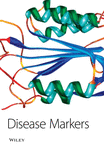Phosphodiesterase 4 D Gene Polymorphism in Relation to Intracranial and Extracranial Atherosclerosis in Ischemic Stroke
Abstract
In ischemic stroke, extracranial MR angiography (ECMRA) is more frequently abnormal in Caucasians and intracranial (ICMRA) in Asians which may have a genetic basis. We report phosphodiesterase (PDE4D) gene polymorphism and its correlation with MRA findings in patients with ischemic stroke.
Consecutive patients with MRI proven ischemic stroke undergoing MRA were included in this study. The severity of atherosclerotic stenosis on MRA was categorized into moderate 50%–80%, severe 80%–99%, and total occlusion 100% using NASCET criteria. The polymorphism in SNP 32, SNP 83 and SNP 87 of PDE4D gene was analyzed by PCR both in the patients and in 188 controls.
Among the 148 patients, MRA was abnormal in 77% patients; ECMRA in 53.8%, ICMRA in 66% and both were abnormal in 42% patients. The frequency of CC genotype of PDE4D83 was significantly higher in the patients with ischemic stroke compared to controls (OR 3.38, 95% CI 1.61–7.11, P = 0.001). The frequency of TT genotype of PDE4D87 was significantly higher ICMRA abnormalities (20%) compared to normal ICMRA (2%). The genotype and allele frequency of PDE4D83 and PDE4D32 were not significantly related to MRA abnormalities. The role of PDE4D87 in atherosclerosis needs confirmation in larger studies.




